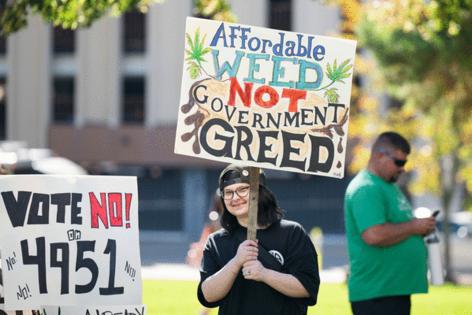New tax on marijuana heads to Whitmer's desk after late-night Senate approval
Published in News & Features
LANSING, Mich. — The Michigan Senate approved a 24% wholesale tax on marijuana early Friday morning, marking the key vote in a wide-ranging deal to increase funding for roads and to achieve a new state budget.
At about 3 a.m. Friday, senators voted 19-17 in favor of the tax hike, which the Legislature's fiscal agencies estimate will generate $420 million in additional annual revenue, after it takes effect on Jan. 1.
The House passed the bill last week 78-21. The legislation moves to Democratic Gov. Gretchen Whitmer next for her signature to complete a long-sought pursuit of a new tax revenue stream to aid the repair of Michigan's crumbling roads.
Supporters of the bill, which was backed by Whitmer, said it was necessary to improve Michigan's roads and bridges.
But opponents, like Sen. Jeff Irwin, D-Ann Arbor, said it would damage an industry that Michigan voters expanded by legalizing recreational marijuana in 2018.
“Businesses will close," Irwin said. "Employees will lose their jobs. Local communities will lose revenue and gain blight and crime."
Last year, Michigan's recreational marijuana retail sales came in at about $3.2 billion, according to monthly reports from the Cannabis Regulatory Agency.
Roughly 39,000 people are employed in the marijuana industry in Michigan, according to state records.
The new 24% tax would be on wholesale marijuana and would be in addition to a 10% excise tax on marijuana retail sales.
The legislation would take effect on Jan. 1, 2026, and would apply to any first sale or transfer of marijuana to a retailer. Businesses that are vertically integrated — ones that do their own growing, processing and retail — would be taxed based on the average wholesale cost of marijuana. That average would be calculated and published each quarter.
The Senate also passed a group of four bills that would implement a roughly $1.9 billion long-term road funding plan through a combination of a 24% wholesale tax on marijuana, a gas tax swap at the pump and spending cuts to some departments.
Under the gas tax swap, Michigan's 31 cents per gallon tax on unleaded gasoline and diesel fuel would increase to 51 cents, but the 6% sales tax on fuel would be repealed, effectively not changing the overall tax burden at the pump.
Through an indirect link to the roads package's gas tax increase, electric vehicle registration fees will increase by $100 and plug-in hybrids by $50.
The House concurred with wide-ranging bipartisan support for the package shortly after 4 a.m. Friday.
Whitmer had originally advocated for levying a wholesale tax on marijuana similar to the 32% tax slapped on tobacco products before they're sold at the retail level.
Still, some lawmakers were skeptical that the new tax on pot could be relied upon to fill potholes.
"I don't think it's going to raise the revenue that we hoped to, which is going to create a problem for our road funding," said Sen. Jonathan Lindsey, a Coldwater Republican who voted no.
Sen. Ed McBroom, R-Vulcan, spoke in support of the new tax as a means of tamping down on the cannabis industry in his Upper Peninsula district.
"We have an industry that is out of control, is too large and is failing to deliver on the promises they gave us," McBroom said.
Most of the yes votes came from Democrats in the Senate's majority party. Republicans Kevin Daley of Lum, Dan Lauwers of Brockway Township and Roger Victory of Hudsonville joined them in support.
Irwin and Sens. Sue Shink of Northfield Township and Sylvia Santana of Detroit joined most Republicans in opposition. Senate Minority Leader Aric Nesbitt, R-Porter Township, voted in opposition.
The votes came after hours of negotiations as the Senate sought to gather votes for passage and immediate effect. Earlier in the day, House Speaker Matt Hall, R-Richland Township, said if the Senate failed to pass the bill, the entire budget agreement would fall apart and the state would have no choice but to enter a government shutdown.
Dozens of protesters and advocates of the marijuana industry gathered at the Capitol throughout the week to protest the vote, which they argued would decimate an already struggling industry. And if the underlying industry collapsed, they warned, the tax would not bring in as much revenue for roads as hoped.
For the first six months of 2025, total cannabis sales were $1.58 billion, down $10.4 million, or 0.7%, from the same period in 2024.
Cannabis Regulatory Agency Executive Director Brian Hanna highlighted in a public meeting last month the challenges facing the market, noting that the retail flower price in Michigan dropped precipitously over the years — from more than $500 per ounce in January 2020 to $62 per ounce in January 2025 or more than 87%.
"We have increasing supply and falling prices," he said last month.
©2025 The Detroit News. Visit detroitnews.com. Distributed by Tribune Content Agency, LLC.







Comments